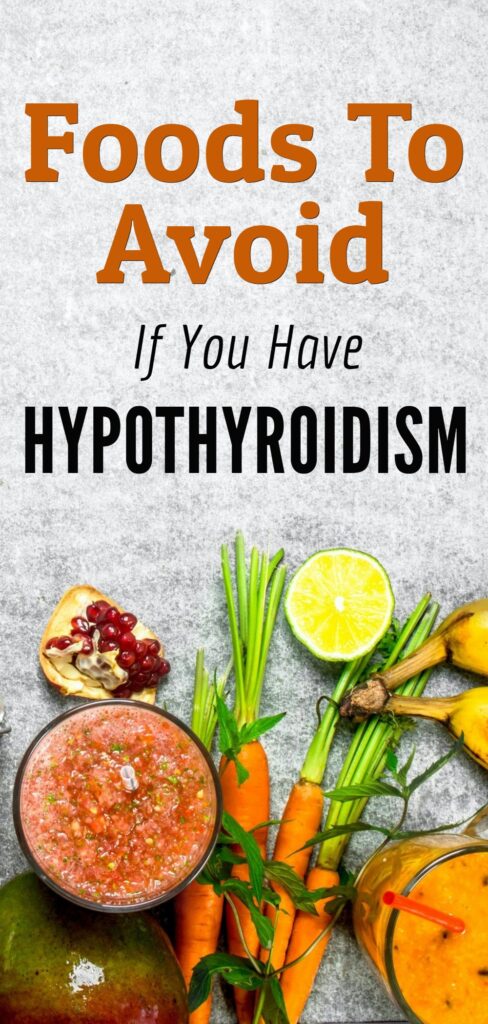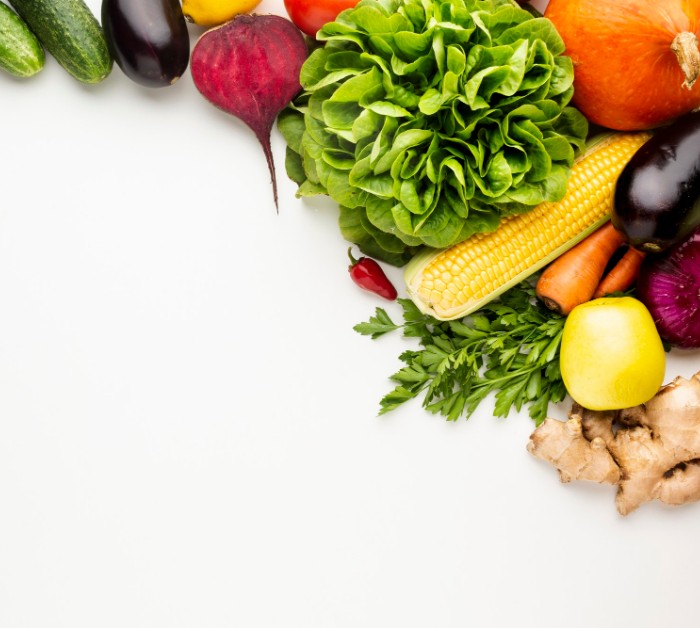Hypothyroidism is a condition that is tricky to manage and what you eat is very important. What is on your plate can be crucial in getting health issues getting better or worse.
Here you can read what foods to avoid if you are diagnosed with hypothyroidism.
Diet and hypothyroidism
When your thyroid is underactive, the gland doesn’t make enough thyroid hormone for normal body functions, resulting in weight gain, feeling tired easily, dry skin, feeling cold, forgetfulness, and even feeling depressed.
Changing the diet can’t cure hypothyroidism, but what you eat is important for managing the condition. For example:
Foods that contain certain nutrients like iodine, selenium, and zinc, can help maintain healthy thyroid function.
Iodine is an important mineral needed to make thyroid hormones. So, people with iodine deficiency may be at risk of hypothyroidism. Foods rich in iodine include dairy, eggs, seaweed, saltwater fish.
Selenium is a micronutrient that plays a role in the production of thyroid hormones and has antioxidant activity. Thyroid tissue naturally contains it. According to a study from 2017 maintaining selenium levels in the body helps people avoid thyroid disease and promotes overall health. Selenium-rich foods: Brazil nuts, tuna, sardines, eggs, and legumes.
Zinc helps the body “activate” the thyroid hormones and studies also show that zinc may help the body regulate TSH, the hormone that tells the thyroid gland to release thyroid hormones.
Some foods may negatively impact thyroid function and worsen symptoms of hypothyroidism, like foods containing goitrogens.
Goitrogens are compounds that may interfere with the normal function of the thyroid gland. Many common foods contain goitrogens, including soy foods, certain vegetables, fruits, and starchy plants, nuts, and seeds.
We will discuss more these foods down in this article but people with hypothyroidism should avoid goitrogens. However, this only seems to be an issue for people who have iodine deficiency or eat large amounts of goitrogens. Also, cooking foods with goitrogens may inactive these compounds.
Foods to avoid for hypothyroidism
Foods with soy, including tofu, edamame, and miso
In a case report from 2017, a 72-year-old female developed severe hypothyroidism after regularly consuming soy-heavy health milk for 6 months. The person’s condition improved after she stopped drinking the beverage and started taking thyroid hormone replacement medication.
However, a study published in 2019 in Scientific Reports, found that soy has no effect on thyroid hormones and very modestly raises thyroid-stimulating hormone levels.
So the effects of soy on thyroid function require more research, and there is some disagreement among researchers whether it’s a good idea for people with hypothyroidism to avoid eating products that contain soy.
The general consensus seems to be that you should wait for few hours after taking your hormone replacement medication before consuming any soy so the soy won’t interfere with your body’s absorption of the hormone.
Foods that contain soy include:
- soy sauce
- soy milk
- tofu
- miso
- edamame
Cruciferous vegetables
Cruciferous vegetables – such as broccoli, spinach, cauliflower, and Brussel sprouts, kale are good for you but they may interfere with the production of thyroid hormone if you have an iodine deficiency.
So for people with iodine deficiency is suggested to limit their intake of cruciferous vegetables, because research suggests that digesting these vegetables may block the thyroid’s ability to utilize iodine, which is important for normal thyroid function.
According to Mayo Clinic, you will need to consume a significant amount of cruciferous vegetables for it to truly impact iodine uptake. There are some things that you can do to make these vegetables less harmful.
One suggestion is that people should limit the amount that they consume on a daily basis, instead of avoiding them altogether since cruciferous vegetables offer numerous health benefits.
Another suggestion, lightly cook these vegetables before eating them and limit your intake of these cooked vegetables to 5 ounces a day. This amount of cooked veggies appears to have no adverse effects on thyroid function.
Gluten
Gluten is a protein found in foods processed from wheat, rye, barley, and other grains. When flour mixes with water the gluten proteins form a sticky network that has a glue-like consistency. The glue-like property makes the dough elastic and gives bread the ability to rise during baking.
People with Hashimoto’s disease – a cause of hypothyroidism are more likely to have celiac disease than the general population. If you have been diagnosed with celiac disease, gluten can irritate the small intestine and may hamper the absorption of thyroid hormone replacement medication.
A clinical trial from 2018 found that a gluten-free diet may have clinical benefits for women with thyroid disease. You may want to talk to a doctor about whether it would be worth eliminating gluten or getting tested for celiac disease.
If you choose to eat gluten, choose whole-grain varieties of pasta, bread, and rice which are high in fiber and other nutrients and can help improve bowel irregularity, a common symptom of hypothyroidism. Also, be sure to take your medications several hours before or after eating high-fiber foods.
Foods high in gluten:
- wheat
- spelt
- barley
- bread
- rye
- pasta
- cereals
- beer
- cakes, cookies, and pastries
Gluten-free grains:
- rice
- oats
- flax
- quinoa
- tapioca
- buckwheat
- amaranth
Processed foods
Processed meat or anything that says “meat product” in it, like hot dogs and pre-sliced packaged sandwich meats are serious offenders of artificial additives that aggravate thyroid issues. Processed foods tend to have a lot of sodium and people with hypothyroidism should avoid sodium.
Foods such as preserved meat, canned desserts, packed chips, or fritters have tons of salt, sugar, oil, and preservatives in them and should be avoided. These foods are empty calories with zero or little nutrition and put an unnecessary calorie burden on the body.
Due to the slower metabolism in hypothyroidism, it makes it harder to burn excess calories and can lead to obesity. Our bodies are unable to recognize most of these pre-packaged foods as nutrients for our body which leaves us depleted of essential vitamins and minerals our thyroid needs to function.
Sugar
Overconsumption of sugar causes spikes in insulin which makes the adrenal gland secrete cortisol. When cortisol levels are too high thyroid hormone production will be hindered.
You want to avoid foods with excess amounts of sugar because it’s a lot of calories with no nutrients. Hypothyroidism can cause the body’s metabolism to slow down, so it is easy to put on pounds if you are not careful.
It is best to reduce the amount of sugar you eat or try to eliminate it completely from your diet.
Coffee
It may be time to trade in that morning cuppa joe for something milder like herbal tea or warm water with lemon.
It is believed that coffee could cause problems with your thyroid function by interfering with thyroid hormone absorption. A case study published in 2008 suggests that caffeine present in coffee can block the absorption of thyroid hormones in the digestive system.
If you must drink coffee doctors suggest waiting at least 30-45 minutes after taking the thyroid supplement to have your cup of coffee or any other beverage for that matter.
Keeping caffeine consumption to one beverage a day (coffee or caffeinated tea) is the best, and if you want to find an alternative to your coffee here is an article that you should read Best Tea Alternatives To Your Morning Coffee With and Without Caffeine.
Alcohol
Alcohol can cause havoc on both thyroid hormone levels in the body and the ability of the thyroid gland to produce the hormone. According to a study from 2013 alcohol can even cause or increase the chances of mood disorders, which are also associated with hypothyroidism.
Most people are aware of the damaging effects that excessive alcohol consumption can have on the liver and overall health. Therefore, people with hypothyroidism should cut out alcohol completely.

Final words for hypothyroidism and what foods to avoid:
Hypothyroidism is a health problem that affects 1-2% of people worldwide. Fortunately, eating the right nutrients and taking medications may help reduce symptoms and improve your thyroid function.
Eliminating or limiting processed foods, sugar, gluten, caffeine, raw cruciferous vegetables, soy, and alcohol will help you achieve optimal thyroid health.
Before making any changes to your diet you must consult your doctor first, and working with a specialized thyroid nutritionist may also help you with your thyroid condition.




